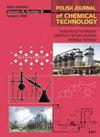Molecular docking, theoretical calculations, synthesis of Ru(III), Pd(II) and VO(II) complexes and activity determination as antibacterial and antioxidant
IF 1
4区 工程技术
Q4 CHEMISTRY, APPLIED
引用次数: 1
Abstract
Abstract Molecular modeling calculations were used to validate 3D structures of new complexes of Ru(III), Pd(II) and VO(II) ions chelated with (E)-2-(phenylamino)-N-(pyridine-2-yl)methylene)acetohydrazide ligand. Furthermore, the calculations were used to estimate selected electronic chemical descriptors which are responsible for the biological activity. The first insight of the compound activity as antibacterial was evaluated by molecular docking analysis. The titled models showed stable binding towards lanosterol 14 alpha-demethylase (CYP51) enzyme of E. coli, indicating their inhibition effect toward bacterial growth. Structural study of the ligand and Ru(III), Pd(II) and VO(II) chelates was done using elemental analysis, FT-IR, 1H-NMR techniques. Furthermore, complexes were physically investigated based on magnetic moment, molar conductance, electronic spectroscopic and thermal analysis techniques. The antibacterial study of the synthesized compounds screened against both Gram-positive and Gram-negative bacteria revealed that these compounds display remarkable antibacterial activity and can be used as therapeutic drugs for pathogenic bacterial diseases. All complexes and ligand showed good scavenging activities which indicate a promising result for their applications as antioxidants.分子对接、理论计算、Ru(III)、Pd(II)、VO(II)配合物的合成及抗菌抗氧化活性测定
摘要分子模型计算用于验证Ru(III)、Pd(II)和VO(II)离子与(E)-2-(苯基氨基)-N-(吡啶-2-基)亚甲基)乙酰酰肼配体螯合的新配合物的三维结构。此外,这些计算被用于估计所选择的负责生物活性的电子化学描述符。通过分子对接分析评估了该化合物的抗菌活性。标题模型显示与大肠杆菌的羊毛甾醇14α去甲基酶(CYP51)稳定结合,表明其对细菌生长的抑制作用。使用元素分析、FT-IR、1H-NMR技术对配体和Ru(III)、Pd(II)和VO(II)螯合物进行了结构研究。此外,基于磁矩、摩尔电导、电子光谱和热分析技术对配合物进行了物理研究。对合成的化合物进行了抗革兰氏阳性菌和革兰氏阴性菌的抗菌研究,结果表明,这些化合物具有显著的抗菌活性,可作为病原菌疾病的治疗药物。所有的配合物和配体都表现出良好的清除活性,这表明它们作为抗氧化剂的应用具有很好的前景。
本文章由计算机程序翻译,如有差异,请以英文原文为准。
求助全文
约1分钟内获得全文
求助全文
来源期刊

Polish Journal of Chemical Technology
CHEMISTRY, APPLIED-ENGINEERING, CHEMICAL
CiteScore
1.70
自引率
10.00%
发文量
22
审稿时长
4.5 months
期刊介绍:
Polish Journal of Chemical Technology is a peer-reviewed, international journal devoted to fundamental and applied chemistry, as well as chemical engineering and biotechnology research. It has a very broad scope but favors interdisciplinary research that bring chemical technology together with other disciplines. All authors receive very fast and comprehensive peer-review. Additionally, every published article is promoted to researchers working in the same field.
 求助内容:
求助内容: 应助结果提醒方式:
应助结果提醒方式:


